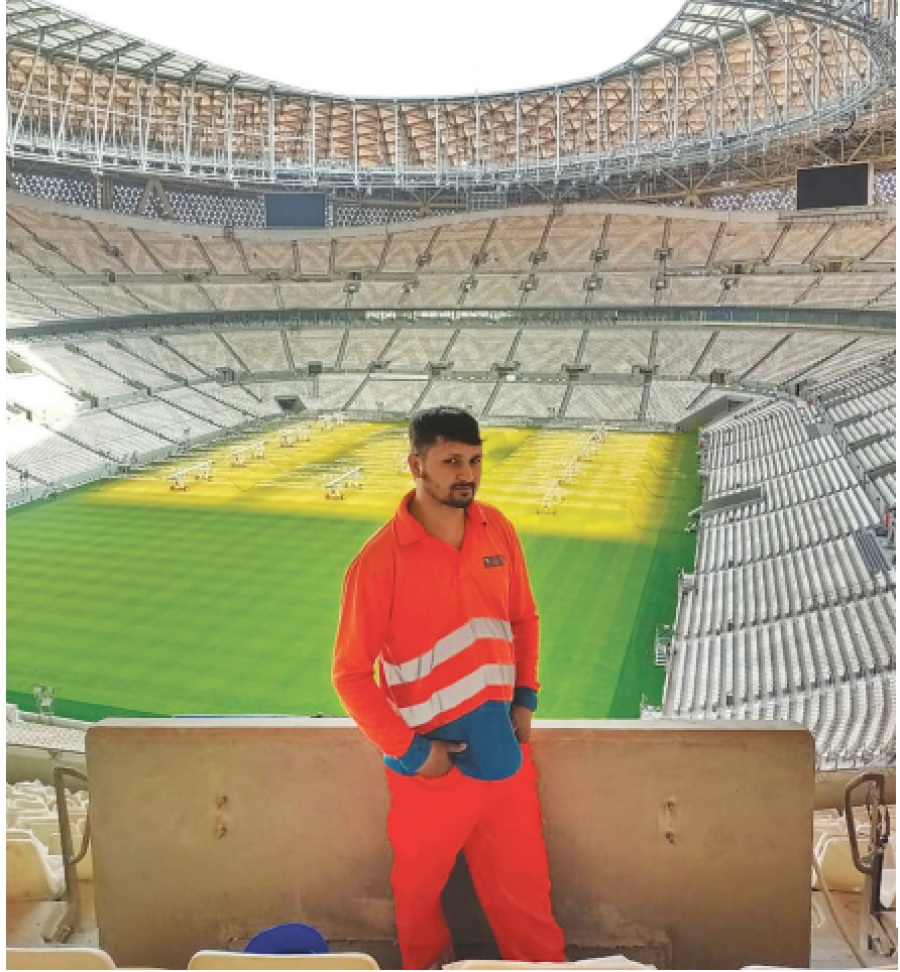Money
World Cup behind the scenes: Workers get raw deal
Many Nepali migrant workers have been facing contract breaches, wage theft and discrimination, according to human rights watchdogs.
Pawan Pandey
Anish Adhikari remembers playing football on the paddy fields after the harvest as a child in his village in Khotang district in Nepal's eastern hills.
Now a 27-year-old migrant worker and avid fan of Argentinean football star Lionel Messi, Adhikari took part in building Lusail Stadium in Qatar where the FIFA World Cup final will be played on December 18.
Adhikari spent 33 months toiling in the heat at the construction site, but there's no chance he will get to see his hero Messi on the field live when Argentina play Saudi Arabia in this same stadium on November 22. His Qatari employers sent him home last year.
“I was abruptly fired and my employer Hamad Bin Khalid Engineering Services ordered me to return home,” Adhikari told the Post. “The company did not renew my identity card for four months after finding out I was trying to switch jobs.”
He also claims the company paid him 1,200 Qatari riyals (Rs42,165) less than promised when he was deported.
This was Adhikari’s second visit to World Cup host Qatar. In 2018, he got a job at a metro station construction site in Doha. He was not paid for three months during the four months he spent there.
“They not only didn't pay me, they fired me and did not allow me to stay in the camp.” So he had to stay at a friend’s house. “My family helped me return to Nepal,” he said.
Adhikari said he went to Qatar again thinking that the companies building the stadiums for the World Cup would pay better.
“I had a dream to watch the World Cup live at the stadium, including my favourite player. That prompted me to return to Qatar.”
Another migrant worker Narayan Sigdel from Nawalparasi East, who worked as a driver for more than three years in Qatar, said he was also cheated.
“I was not given a bonus at the end of my employment. They did not pay me 6,500 riyals (Rs228,398),” he said.
“Besides being paid less, workers have to endure verbal abuse at the workplace,” he said. “There is no respect for migrant workers.”
Sigdel paid a Rs65,000 fee to secure a job in Qatar in 2016. Adhikari borrowed Rs110,000 so he could pay the fee to get a job at Lusail Stadium.
“I borrowed Rs80,000 at 60 percent interest from a local money lender. The interest on the rest of the loan is 36 percent,” said Adhikari.
Adhikari was told he would be working as an electrician's helper and would earn 900 riyals monthly before he flew to the Gulf country in March 2019.
The agent had assured him that the recruitment fee he had paid would be refunded after he started working. He was also assured that he would not have to pay for his meals and accommodation. But it did not happen that way.
Many Nepali migrant workers have been facing contract breaches, wage theft and discrimination, including forced labour in unsafe working conditions, according to human rights watchdogs.
“None of the promises was fulfilled,” said Adhikari during the launch of If we complained, we are fired: Discrimination and Exploitation of Migrant Construction Workers on FIFA World Cup Qatar 2022 Stadium Sites, an investigative report made public on Thursday.
The report was produced by Equidem, a human rights and labour rights charity.
“I was made to work as an AC line helper, and my salary was reduced to 750 riyals.” However, Adhikari received only 600 riyals a month. “They said 150 riyals had been deducted for room and board.”
Whenever he filed a complaint with his superiors, they threatened to fire him. “I got a chance to talk to FIFA officials twice or thrice, but that too did not produce any outcome.”
According to Adhikari, the employers prevented workers from meeting, interacting or lodging complaints with the officials from the Supreme Committee for Delivery and Legacy, the local body established in 2011 by the state of Qatar.
The body was responsible for the delivery of the World Cup.
“During inspection visits by FIFA officials, we were sent to camps,” he said. “They used to turn on the fire alarm to make the workers stop working and assemble on the site, then we would be taken out of sight of the officials.”
According to the report, the employers deceived the inspection team every time they visited the construction sites.
Workers were made to move to alternate locations during inspections. According to the report, sites were prepared to meet inspection standards, and workers were employed on sites that were not audited.
Workers were penalised for making complaints, the report said. And companies falsely represented worker salaries in the company books, the report says. The workers were made to work in 40 to 50-degree Celsius heat without sufficient water or rest.
Adhikari tried to get another job but was unsuccessful.
“On my return, they deducted 1,200 riyals from the amount I was supposed to get,” he said. “They did not give any reason.”
Adhikari is one of the 60 migrant workers from Asia and Africa whom Equidem interviewed during their investigation from September 2020 to October 2022.
Workers engaged in the construction of the stadiums from 2014 to 2022 were interviewed during the investigation.
Qatar employed more than 30,000 migrant workers to build the stadiums for the World Cup. Qatar and FIFA have spent $229 billion on preparations for the World Cup.
The report said Qatar conducted a severe human rights violation.
The workers Equidem interviewed share stories of illegal recruitment, forced labour, nationality-based discrimination, wage theft, overwork, workplace violence, and health and safety risks.
The Gulf country has rejected the demand of international human rights and migrant rights organisations to set up a compensation fund, equivalent to the World Cup’s prize money of $440 million, for the workers who died and sustained injuries working in World Cup-related projects.
Last week, Qatar Labour Minister Ali bin Samikh Al Marri told Agence France-Presse, a Paris-based international news agency, that the demand was a "publicity stunt."
Marri said Qatar already had a fund to deal with worker deaths and injuries.
"This call for a duplicative FIFA-led compensation campaign is a publicity stunt," Marri told the AFP. "Our door is open. We have dealt with and resolved a lot of cases."
“Despite the evidence of labour rights abuse in World Cup-related projects, Qatar’s efforts to ignore this issue is disheartening,” said Rameshwar Nepal, executive director of Equidem Research Nepal.
“Organising the World Cup could have been an opportunity for the country to bring extensive reforms in its labour sector. However, the country has so far missed this chance,” said Nepal.
"Though FIFA seems to have tried to keep an eye on the condition of labourers to some extent, their monitoring has not been effective. It could have done much more in the decade after Qatar was declared the host for World Cup 2022.”
Adhikari still hopes to get his money back even though he will have to watch his favourite football player on television.
“I wish star players like Messi, Ronaldo, Neymar, Mbappe and Benzema would speak up for the rights of migrant workers,” said Adhikari. “Their voices, obviously, would make our cause stronger.”




 19.12°C Kathmandu
19.12°C Kathmandu














